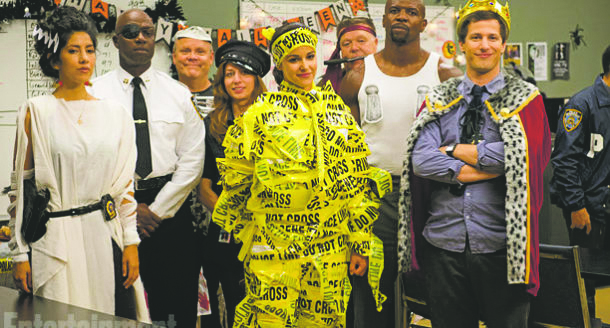
“Brooklyn Nine-Nine” may have taken home two Golden Globes, but that doesn’t mean that anyone other than the Hollywood Foreign Press Association has ever actually seen it. Like a long line of comedies before it, “Nine-Nine” struggles to boost its ratings amid a mass of equally unmemorable comedies and threateningly popular dramas. The struggle has existed since the dawn of reality series and new-era, dialogue-driven dramas beginning, perhaps, with “The Sopranos” and ending with “Breaking Bad.” Even the undying detective- and doctor-themed shows continue to receive generous ratings (“Law and Order: SVU,” “Grey’s Anatomy”) in comparison to TV comedies.
This doesn’t mean comedies are bad. Some of the greatest shows around are those laugh-out-loud sitcoms. “Seinfeld,” “Scrubs,” “The Office” (during the Michael Scott years) and “How I Met Your Mother” (its earliest seasons) come to mind. What each of these comedies have in common, in addition to today’s highest-rated comedies — “The Big Bang Theory” and “Modern Family” — is their writing. For a comedy to succeed, it’s got to have that cunning wit paired with an endearing quality that makes you fall in love with its goofy characters (aka “Bang’s” hilariously nerdy Sheldon Cooper, played by Jim Parsons). Unfortunately, for most comedies, a lot of the writing revolves around punch lines and hit-or-miss jokes, which fail to garner a big enough audience to stay on the air. Plus, it’s harder than ever before to write original funny material without repeating what has already been done. Why do you think comedians struggle for so long?
Dramas fare better because they have the ability to draw you in with their swerving story lines and emotional intensity. They blur the line between what is morally acceptable, exploring more diverse, captivating stories that all at once introduce us to something new while simultaneously relating us to the characters. We may not be meth makers or drug dealers, but how many of us were rooting for Walter White? Because an hour-long episode of “Breaking Bad” typically has a more complex plot, it makes the audience more invested in its characters and more prone to attachment. That being said, characters are more expendable. The power of the unexpected always keeps the audience tuned in, even if nothing happens until the end of the episode. With a comedy, characters are often unchanging; the drive of each episode usually comes from the situation within it, not an overall story. Whereas dramas incorporate action, romance and plot twists, comedies stick to their basic premise.
Many networks, namely CBS and NBC, bank on their comedy lineup, but it doesn’t always work out as they intend. A lot of the fault lies in the marketing and advertising of the shows. When a new comedy airs, it’s mostly gimmicky jokes in tandem with a gaudy laugh track — that’s when you know that the 30-second commercial is the best you’re going to get. The commercial should highlight the show’s intellect and relatability to make it stand out. That’s why “Modern Family” is so successful — it features a funny predicament that everyone can relate to, and it teaches moral lessons while making you laugh. For newer comedies, those gimmicky one-liners are just not going to cut it. One commercial will tell you that it’s not worth your time.
While this sounds like comedy-bashing, it’s not. In fact, many people’s favorite shows are comedies. People don’t always want to watch an hour-long procedural, but would rather enjoy a half-hour sitcom. One thing that most comedies have in their favor is their tendency to gain a cult following. It’s true that their niche market is the reason for their lower ratings, but it’s also true that this market is often what saves them from going off the air. Great cult comedies include “Community” and “Arrested Development” — “Community” was saved by its fan following, and “Arrested Development” was brought back as a limited-run series on Netflix. Indeed, comedies have a lot of help from non-television viewing sources like Hulu, Netflix and DVR.
The bottom line is that a show is only as good as its writing. If it leaves you dwelling on what happened long after the episode has aired, it has done its job. While there may be no precise formula for success, watching success stories like “The Big Bang Theory” may be a step in the right direction.


